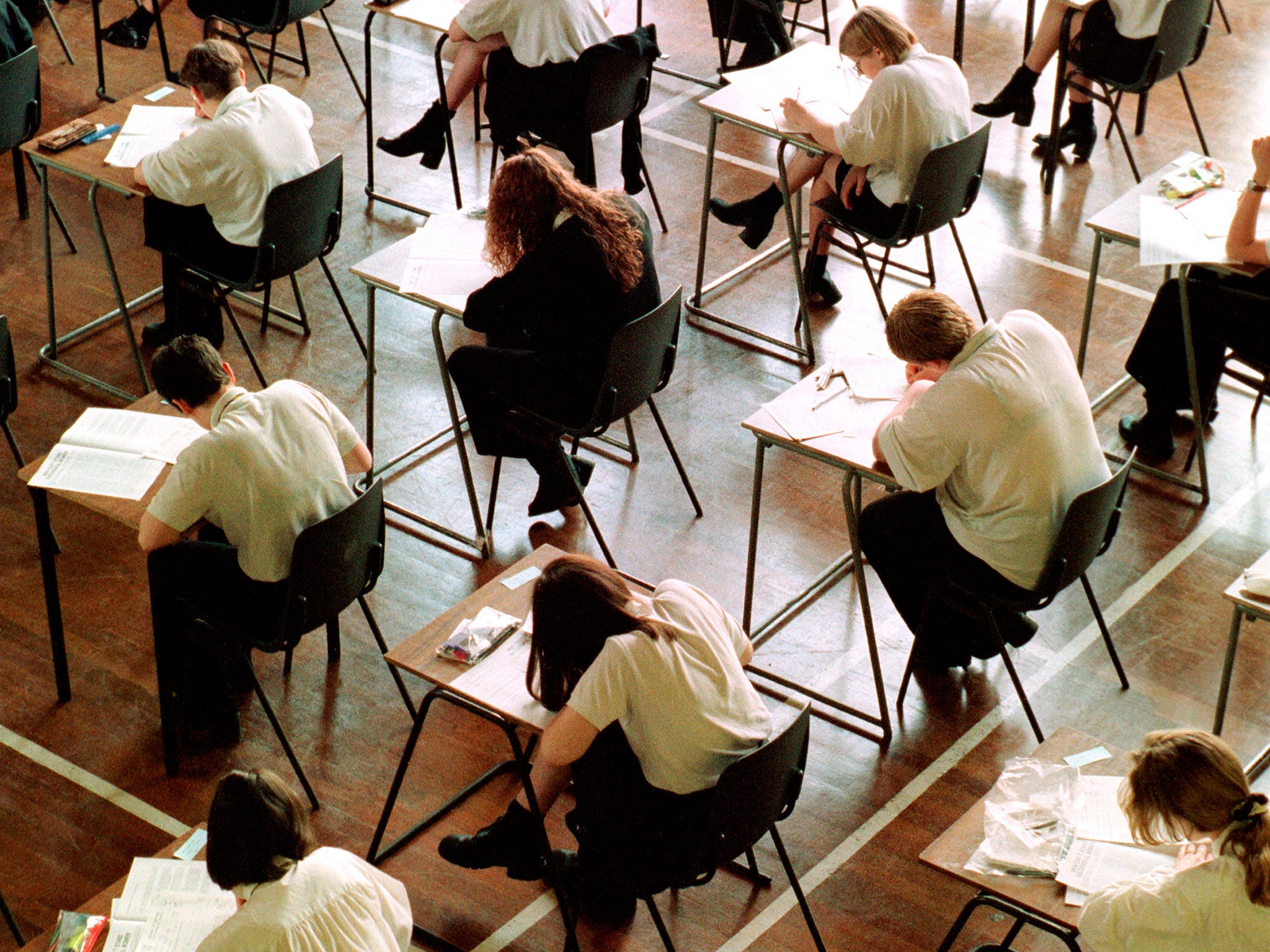Grammar schools to offer lower pass marks to poorer pupils
Shake-up of 11-plus designed to ward off criticism of proposed new selective schools

Your support helps us to tell the story
From reproductive rights to climate change to Big Tech, The Independent is on the ground when the story is developing. Whether it's investigating the financials of Elon Musk's pro-Trump PAC or producing our latest documentary, 'The A Word', which shines a light on the American women fighting for reproductive rights, we know how important it is to parse out the facts from the messaging.
At such a critical moment in US history, we need reporters on the ground. Your donation allows us to keep sending journalists to speak to both sides of the story.
The Independent is trusted by Americans across the entire political spectrum. And unlike many other quality news outlets, we choose not to lock Americans out of our reporting and analysis with paywalls. We believe quality journalism should be available to everyone, paid for by those who can afford it.
Your support makes all the difference.Grammar schools could be forced to lower the 11-plus pass mark for children from lower-income families in order to end the stranglehold middle-class pupils have on places, Government sources have said.
The proposed reforms, to be announced next month, came as Prime Minister Theresa May revealed she is poised to allow the creation of new grammar schools for the first time since 1998.
Government insiders told The Times that rules governing social mobility requirements for new selective schools could be rolled out to the existing 163 grammar schools.
Following a Select Committee report, grammar schools could be required to take account of the social background of applicants and to lower the entrance requirement accordingly.
They could also be required to admit some pupils later in 12-plus or 13-plus tests to allow for the fact that some children are late developers and to mitigate the “all or nothing” nature of the 11-plus.
The move is designed to open up grammars to “ordinary, working-class families” but is likely to face stiff opposition from many parents and politicians in the leafy Conservative shires where the majority of the remaining grammar schools are.
Existing grammars aim to select the top 10 per cent of children by academic ability but the new grammars will be less selective, targeting the top 25 per cent.
Peter Lampl, chair of the Sutton Trust, told The Independent the proposal was a step in the right direction for improved social mobility.
“We welcome the expectation that grammar schools do more to attract disadvantaged pupils, including by lowering the pass rate for this group. But we want to see fairer admissions policies working in existing grammar schools before their number is allowed to increase.”
The Trust found that 18 per cent of pupils were given private tuition to help get them through the 11-plus – although the real figure could be even higher as not all parents admit that their children need extra help.
With private tuition costs averaging £25 per hour, critics claim this skews the playing field in favour of those children with wealthier or pushier parents rather than measuring raw ability.
Education ministers have tried to quell fears that new grammars will mark a return to a “two-tier” system by stressing they will have to accept a significant proportion of children from lower income families. But Education Secretary Justine Greening was heckled at a teaching conference this week when she said grammars “help close the attainment gap between rich and poor children”.
More than 10 per cent of pupils who win places at state grammar schools have attended fee-paying primary schools, and former head of Ofsted Michael Wilshaw criticised the schools for being “stuffed full of middle-class children whose parents might otherwise have gone private”.
The 163 grammar schools are mainly scattered across Tory heartlands in Essex, Kent, Buckinghamshire, rural Lincolnshire and Buckinghamshire, with only a tiny number in a few cities, including Birmingham and Liverpool.
Most towns and cities do not have a grammar school and the overwhelming majority of children do not currently sit an 11-plus exam, which was first introduced by the Butler Act in 1944 and was sat by all primary school pupils until 1965, when the Labour government introduced comprehensive schools.
Some grammar schools already have a flexible entrance exam with the aim of helping disadvantaged children win places, including the King Edward VI Foundation, which runs five grammar schools in Birmingham.
Labour is opposed to the Government’s proposals to allow new grammar schools but has been accused of hypocrisy because many from the shadow frontbenches attended grammars themselves or used them for their children.
Labour leader Jeremy Corbyn is vehemently opposed to selective education and divorced his wife of 12 years, Claudia Bracchitta because she insisted on sending their son to a grammar school and not the local comprehensive.
Shadow Education Secretary Angela Rayner said this week the proposed new grammar schools are a “vanity project” and urged the Government to concentrate on funding and improving existing schools.
Join our commenting forum
Join thought-provoking conversations, follow other Independent readers and see their replies
Comments